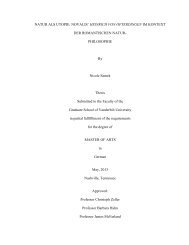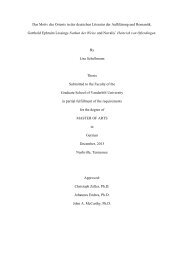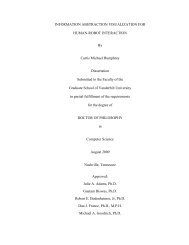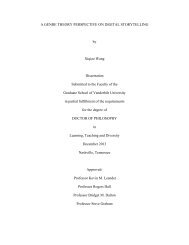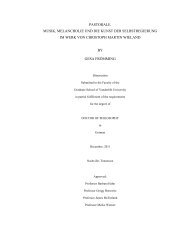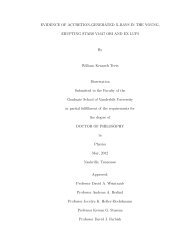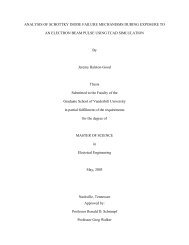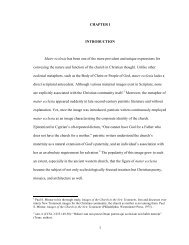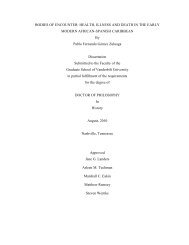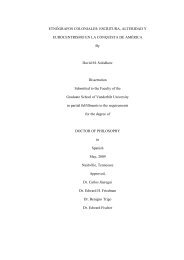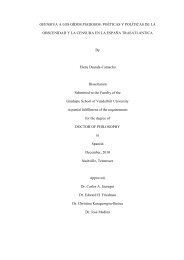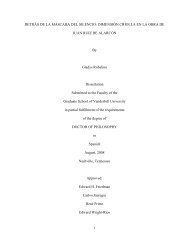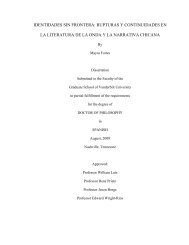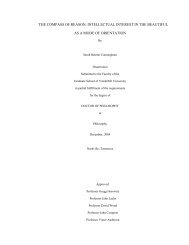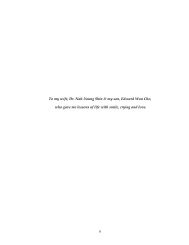THE DEATH OF DIONYSOS - ETD - Vanderbilt University
THE DEATH OF DIONYSOS - ETD - Vanderbilt University
THE DEATH OF DIONYSOS - ETD - Vanderbilt University
You also want an ePaper? Increase the reach of your titles
YUMPU automatically turns print PDFs into web optimized ePapers that Google loves.
accompanies Mariane backstage into the sensuous disorder of the dressing room; or his<br />
disappointment over the shallow and selfish interests of the actors (59-60). These were<br />
not the “edle Menschen” [“noble human beings”] he had imagined, ordained to glorify<br />
God and Nature! Although Wilhelm has grown older since his first experiments on a<br />
homemade stage, he is little wiser when it comes to the true nature of the theater. He fails<br />
to recognize that acting is an art that requires mastery; that (in Goethe’s novel) the actor<br />
must have his voice, features, and movements under control, so that he can project an<br />
image for which there is no underlying conscious state. To the contrary, Wilhelm<br />
confuses the illusion of art with a higher truth, imagination with revelation. This<br />
misunderstanding will persist, if not without some revision, even after he has performed<br />
with some success with Serlo and his professional actors. Not until his initiation into the<br />
Tower Society does Wilhelm recognize his error (“Irrtum”): “‘daß ich da Bildung suchte,<br />
wo keine zu finden war, daß ich mir einbildete, ein Talent erwerben zu können, zu dem<br />
ich nicht die geringste Anlage hatte!’” (495). [“‘seeking cultivation where none was to be<br />
found, imagining I could acquire a talent to which I had no propensity’” (EAB 302).]<br />
During the initiation ceremony a man whom Wilhelm recognizes from an earlier<br />
encounter, and who bears some resemblance to the Abbé, appears from behind the curtain<br />
and declares:<br />
“Nicht vor Irrtum zu bewahren, ist die Pflicht des Menschenerziehers,<br />
sondern den Irrenden zu leiten, ja ihn seinen Irrtum aus vollen Bechern<br />
auschlürfen zu lassen, das ist die Weisheit der Lehrer. Wer seinen Irrtum<br />
nur kostet, hält lange damit Haus, er freuet sich dessen als eines seltenen<br />
Glückes, aber wer ihn ganz erschöpft, der muß ihn kennenlernen, wenn er<br />
nicht wahnsinnig ist” (494ff.).<br />
[“The duty of a teacher (of humans) is not to preserve man from error, but<br />
to guide him in error, in fact to let him drink it in, in full draughts. That is<br />
the wisdom of teachers. For the man who only sips at error, can make do<br />
with it for quite a time, delighting in it as a rare pleasure. But a man who<br />
drinks it to the dregs, must recognize the error of his ways, unless he is<br />
mad” (EAB 302).]<br />
In these words the speaker formulates a central tenet in the pedagogical program of the<br />
Tower. Most people get along in life, with more or less success, guided by flawed,<br />
perhaps dogmatic notions about the world and proper conduct. The true teacher of<br />
humanity (“Menschenerzieher”), however–who would raise humans worthy of the name–<br />
7



